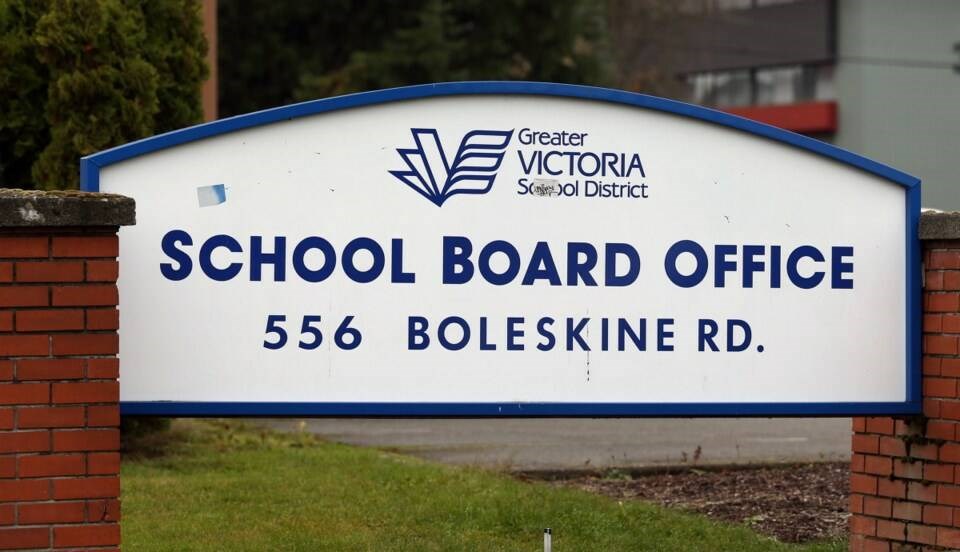Quick, name three school trustees. Or two. Or one.
Stumped? You’re not alone. Compared to municipal councils, school boards tend to be like the witness protection program, a good hiding place for those seeking anonymity.
Indeed, with so many of the big decisions in education — curriculum, budget, union contracts — handled higher up the governmental food chain, many of us are unsure what’s left for trustees to do. Something about earthquake preparedness, maybe?
As a result, public engagement in school-board elections is pretty low, which means that those who do engage, making a determined effort to gain influence at that level, stand a pretty good chance of success. A well-organized campaign can exploit the void.
That’s what has some B.C. teachers worried. They fear candidates linked to hard-right politics will get elected to school boards Saturday, using their newfound beachhead to push a socially conservative agenda.
The emergence of a six-member Vancouver Island Voters Association slate among the 30 people running for the Greater Victoria school board prompted the Greater Victoria Teachers Association to draw up its own list of nine preferred candidates: Natalie Baillaut, Angela Carmichael, Mavis David, Derek Gagnon, Karin Kwan, Emily Mahbobi, Nicole Duncan, Diane McNally and Rob Paynter, the latter three being incumbents.
“Victoria teachers have chosen to support candidates who openly support safe and inclusive schools for all our students, specifically including those in traditionally marginalized communities such as queer students and students of colour,” a teachers association representative was quoted as saying.
Safe to say the VIVA candidates, some of whom complain that students already have a political agenda foisted upon them, aren’t thrilled with the way they are characterized.
It will be up to the voters to sort all this out — though, again, it’s impossible to know how many will do so confidently. Many of the voters who march into the electoral restaurant certain of their municipal council selections, their entrees, find themselves staring at the school board ballot, the dessert menu, as an afterthought.
Which leads to a basic question: Why elect trustees at all? If people are so disengaged that the boards are vulnerable to invasion by whatever three-jeep army rolls down the road, why not just dispense with elections and let the province stack boards with political appointees instead?
That was the conclusion the NDP government of the 1990s came to when it did away with locally elected hospital boards, in part because low voter turnout allowed those bodies to be dominated by well-organized single-interest groups, notably anti-abortion ones.
In fact, B.C.’s school boards have also lost much of their power over time. Forty years ago, boards negotiated with district employees directly and raised much of their own revenue by setting local property taxes.
Trustees were gradually stripped of their authority, though, beginning in the early 1980s.
That’s when the Social Credit government took away their power to tax commercial and industrial properties, which complained they were being bled dry by free-spending trustees. Eventually, the boards lost their taxation power altogether.
Individual school districts also lost the ability to negotiate teacher and support-staff contracts. Bargaining has been done on a provincewide basis since 1994.
That leaves us with what we have now: boards of education with almost no ability to raise revenue and little leeway to determine how it is spent, since their budgets are largely devoted to paying for labour agreements imposed from above.
That leads to periodic clashes in which the school boards complain that the Education Ministry hasn’t allowed them a budget big enough to cover the cost of contracts that the province itself approved.
Since school districts — unlike the province — can’t run deficits, it is left to the trustees to make the ugly choice of whether to lay off teachers, close schools or find some other way to balance the books.
Trustees argue that these clashes show there is value in having local advocates to hold the province’s feet to the fire. Residents want their schools run by people who know the community. And boards have more power than people think: The province might provide the broad map, telling the boards to drive from A to B, but it’s the local trustees who decide which route to take to get there. School districts aren’t identical, and can’t all follow the same road to get to the same place.
Each of the capital region’s four school districts — Greater Victoria, Sooke (encompassing the West Shore), Saanich (mostly the Peninsula) and Gulf Islands — has its own quirks.
School buses are a much bigger deal in Sooke than in Greater Victoria. Gulf Islands, which ferries students by water taxi, cut transportation costs by going to a four-day school week.
And that brings us back to the question of who you want driving the (school) bus.
> For more Vancouver Island election news and candidate information, go to timescolonist.com/civic-election



